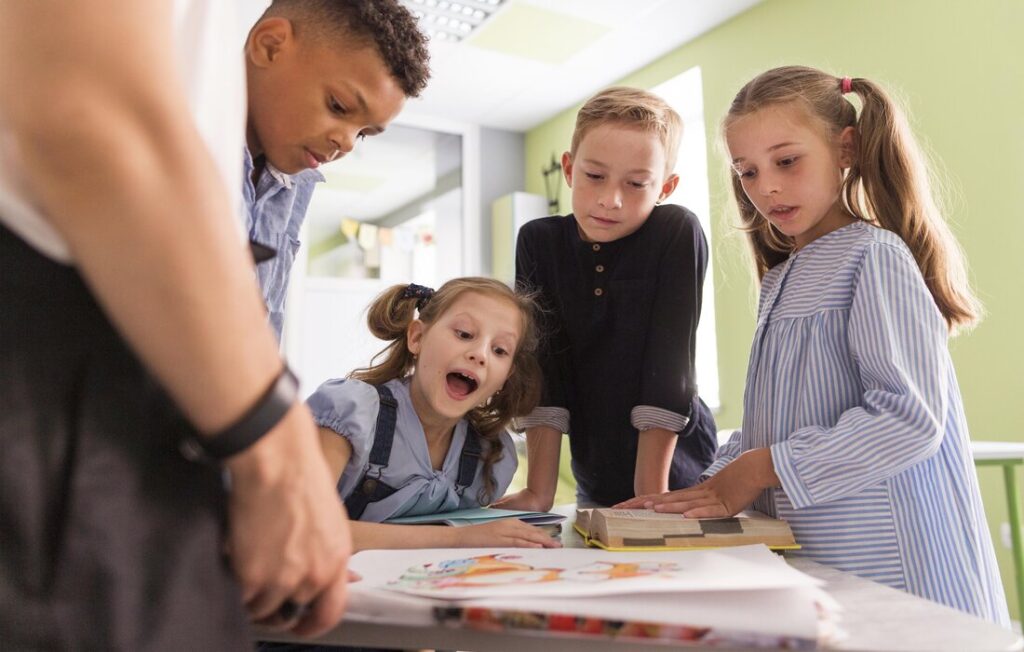Learning through fun transforms education by integrating enjoyment into the learning process, making knowledge acquisition more engaging and effective. This approach, supported by research in neuroscience and psychology, shows that play stimulates memory and motivation, offering a refreshing alternative to traditional methods. By emphasizing curiosity and interaction, it invites deeper and more sustainable exploration of knowledge, marking a shift toward more dynamic and fulfilling educational strategies.
Theoretical Foundations
Play-based learning is rooted in solid theoretical foundations, blending cognitive psychology, neuroscience, and pedagogy to reveal how play optimizes learning. Cognitive psychology shows that play enhances engagement and information retention, while neuroscience explains that play activates dopamine release, improving focus and memory. Pedagogical theories, such as constructivism and the Montessori method, highlight the importance of direct experience and autonomy, aligned with learning through play. Together, these disciplines provide a scientific basis that validates the effectiveness of play as a learning tool, encouraging educational methods where joy and discovery take center stage.
Benefits of Play-Based Learning
Play-based learning enriches education by improving information retention and making learning more effective through engaging activities that stimulate the brain. It fosters the development of social and emotional skills, such as empathy and communication, by encouraging collaboration. Furthermore, it enhances creativity and critical thinking, inviting students to explore various solutions to problems. Finally, this approach boosts motivation and engagement, transforming education into a positive and captivating experience. In summary, play-based learning offers a holistic teaching method that prepares students for academic and social success.
Energizing Learning Through Play
To effectively integrate play into traditional learning environments, several strategies and techniques can be adopted:
- Using educational board games: Transforming key concepts into game elements to facilitate learning.
- Organizing role-playing games: Simulating historical, scientific, or literary events for immersion in the subject.
- Incorporating interactive technologies: Using apps and online platforms for interactive quizzes and simulations.
- Personalizing learning: Tailoring playful activities to each student’s level and interests to maximize engagement.
- Role-playing and simulations: Enacting real-world scenarios to develop problem-solving and critical thinking skills.
- Creating a positive learning environment: Encouraging active participation, valuing each contribution, and celebrating successes to build confidence and motivation.
These approaches make learning more interactive and engaging, fostering a better understanding of subjects and boosting students’ motivation. By adopting these strategies, teachers can transform classrooms into dynamic spaces where learning becomes a captivating and enriching adventure.
Tools and Resources for Play-Based Learning
Adopting play-based learning requires a range of suitable tools and resources that can transform education into an enriching and enjoyable experience. Here is a curated selection to facilitate this integration:
- Recommended educational games and apps: Platforms like Kahoot! and Quizlet offer interactive ways to review and learn through quizzes and memory games. These digital tools capture students’ attention and make learning more dynamic.
- Playful activities for different ages and subjects: Building games like LEGO® Education promote problem-solving and critical thinking for younger learners, while economic or scientific simulation games can engage older students in complex learning intuitively.
- Tips for choosing the right play-based learning tools: It is crucial to select games and activities suitable for the age level and educational goals. Teachers should look for resources that encourage collaboration, creativity, and support the specific learning objectives of their curriculum.
Transforming Education: Success in Play-Based Learning
The positive impact of play-based learning is illustrated by concrete examples in schools, homes, and communities worldwide. Pioneer schools have integrated role-playing games and simulations into their programs, observing a marked improvement in student engagement and knowledge retention. At home, parents and children explore educational concepts together through games and apps, strengthening learning in a fun and interactive way.
Feedback from teachers and parents highlights the effectiveness of this method: increased classroom participation, improved attitudes toward learning, and awakened curiosity among students. These successes show that play-based learning is not only enjoyable but also a solid pedagogical strategy capable of transforming the educational experience into a captivating and enriching adventure for all.
Overcoming Challenges in Play-Based Learning
Integrating play into education is not without challenges. A major obstacle is the perception that play is neither serious nor effective for learning. To overcome this, it is essential to share evidence of its positive impact on education. Balancing play with academic requirements requires clearly linking each playful activity to a learning objective, necessitating careful planning.
Evaluating the effectiveness of play-based learning is also a challenge. Educators need to use suitable assessment methods, such as portfolios or self-assessments, to measure progress holistically. Collaboration among teachers, parents, and students is crucial to designing and evaluating playful activities, making play a valued educational tool.
By addressing these challenges with creativity and commitment, it is possible to make education more dynamic and enriching, using play as a powerful lever for learning.
Inspired to start your language-learning journey? Dive into Lora, our free VR game, now available on the Meta Store in early access! Experience immersive language learning like never before. Discover how this approach enriches education, boosts engagement and retention, and develops essential skills in students for a bright future. Read more about innovative approaches to education.

